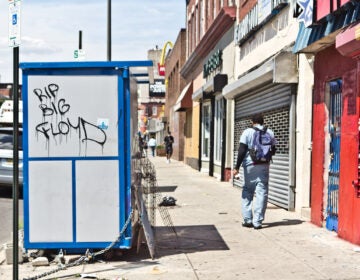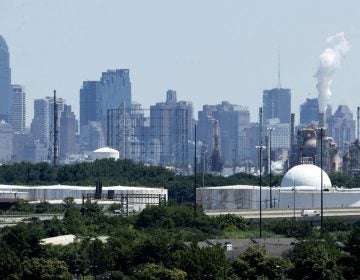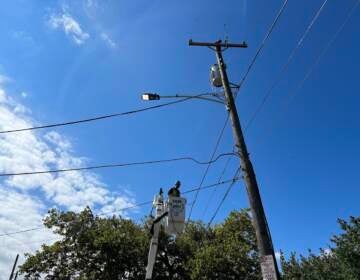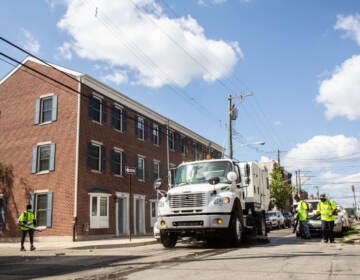Street sweeping to continue in 6 Philly neighborhoods and on business corridors
Budget cuts, however, will prevent a planned expansion of the city’s street cleaning program.
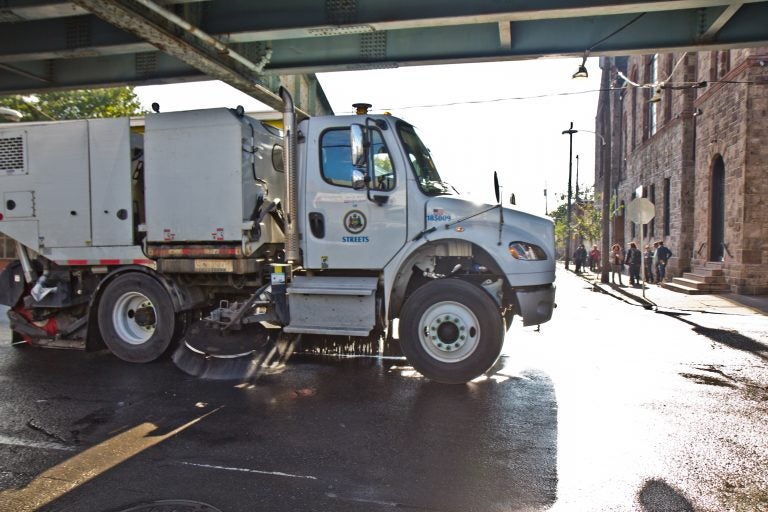
A street sweeper works along Kensington Avenue in Philadelphia. (Kimberly Paynter/WHYY)
Like a phoenix rising from the ashes of an extinguished dumpster fire, Philadelphia’s on-again-off-again affair with renewed street sweeping may be back on.
Just seven weeks ago, officials said plans to expand a year-and-a-half-long street cleaning pilot program were instead headed for the dump — one of many cuts as the city heads into a $749 million budget shortfall triggered by the COVID-19 crisis.
But it appears that even as Mayor Jim Kenney battles with City Council over cuts to affordable housing, parks, arts and other city initiatives, officials clarified that some expanded cleaning services were likely to continue.
City spokesperson Kelly Cofrancisco said that the administration wants to preserve cleaning in six pilot zones that received services last year.
“Equipment and staff continue to be deployed in areas across the city, including the business corridors and the original mechanical sweeping pilot,” Cofrancisco said.
Dropping the entirety of the program would also risk wasting some of the $9 million Cofrancisco said the city had invested in street cleaning since the start of 2019, including $6.6 million in new sweeper trucks and other vehicles purchased in anticipation of citywide cleaning operations.
Due to ongoing budget negotiations, it was still unclear how much funding the Streets Department would ultimately receive. But Cofrancisco said that the administration was seeking to shift revenue drawn from the city’s 0.4% tax on gasoline sales toward litter collection.
In addition to continuing to clean six neighborhoods served by the initial pilot, Cofrancisco said the city’s Commerce Department would move forward with another cleaning program later this summer, called the “Philadelphia Taking Care of Business Clean Corridors Program.”
A ‘clean corridors’ program with job-creation goals
The clean corridors program is the outgrowth of $10 million in city funds set aside last year by City Council to bolster cleaning on major streets and other “high-litter” areas. Instead of the city’s Streets Department, this money would be contracted out to “community-based organizations” either to create in-house cleaning programs or to subcontract out the work.
An RFP issued by the Philadelphia Industrial Development Corporation for this program — designed before protests over police brutality and racism broke out — includes among its goals creating jobs for businesses owned by Black entrepreneurs and others who identify as something other than the white male identity that has dominated public contracting for generations.
“The robust economic development program will expand the Commerce Department’s existing commercial corridor cleaning efforts, while also creating contract opportunities for local minority- and women-owned businesses, as well as new job opportunities for Philadelphians,” Cofrancisco said.
Cofrancisco said the city would draw $7 million from that pool of funds to kickstart a first year, with the possibility of additional funds being committed in subsequent years.
Still, both programs are far short of the ultimate goal of citywide cleaning the administration had previously set. Philly is the only major city without a regular street cleaning program.
Neighbors also remain skeptical that the city had or would ever commit to regular cleaning.
Nicholas Fury is an auto shop owner who lives and works in Kensington, one of the six neighborhood pilot zones the city says it has been cleaning with some regularity since 2019.
“I heard all about it,” Fury said of the street sweeping pilot, in late May. “But I have actually witnessed them using the trucks maybe once? I haven’t seen one since last fall.”
While he acknowledged the neighborhood faced much larger problems linked to the opioid epidemic, Fury said the out-of-control trash problem was still “demoralizing and annoying” for neighbors that tried to keep their blocks clean.
If the city was still cleaning up, it wasn’t doing a good job, he said. The level of trash and food waste on the street was so bad, it was attracting pests to residential blocks.
“We have a huge rat problem. I’m pretty sure it’s all over the neighborhood. I’ve heard from my neighbors blocks away complaining about rats,” he said. “You can hear them at night.”

Show your support for local public media
WHYY is your source for fact-based, in-depth journalism and information. As a nonprofit organization, we rely on financial support from readers like you. Please give today.



